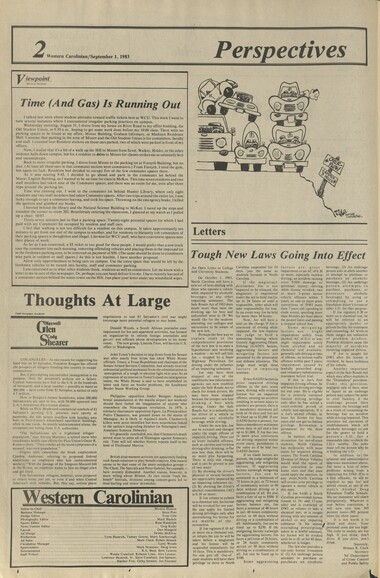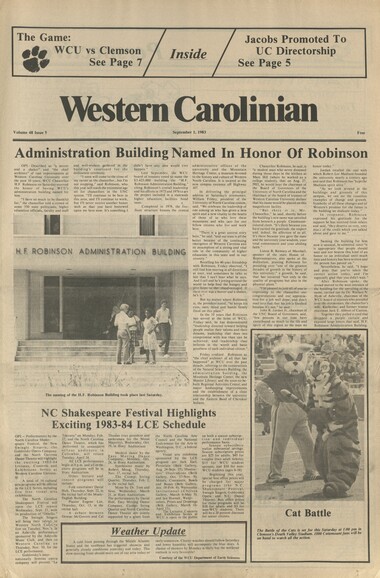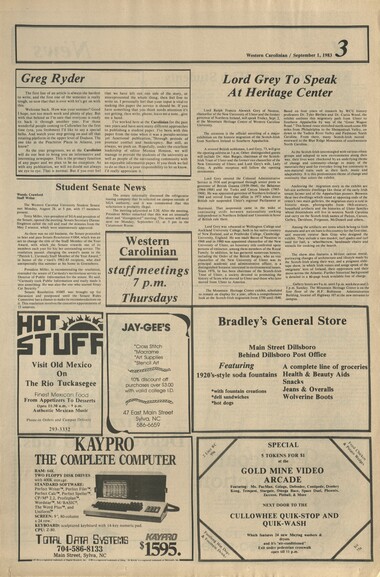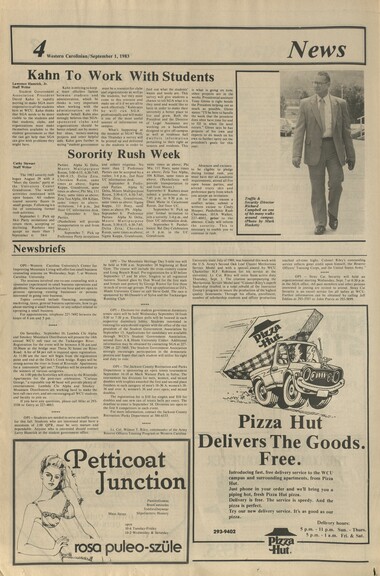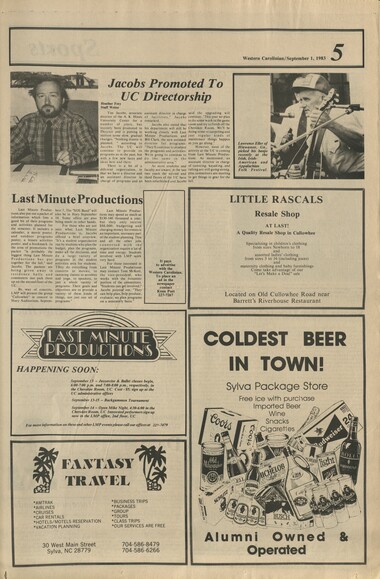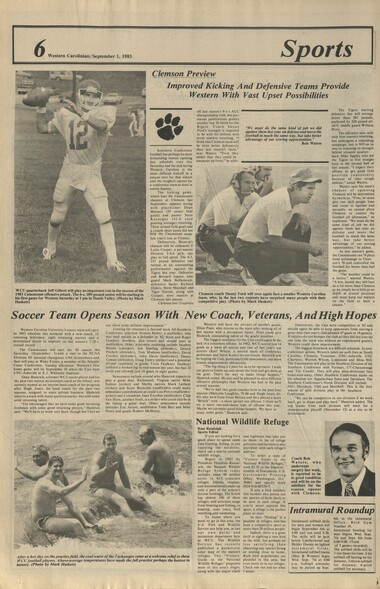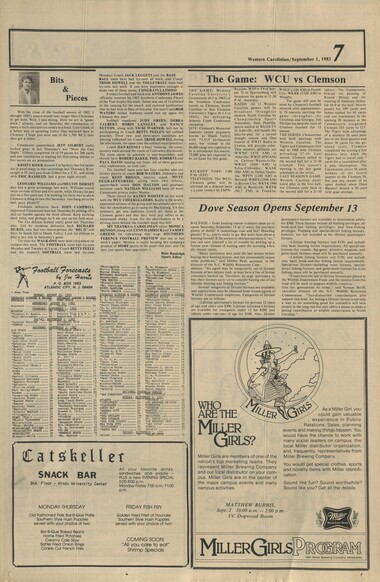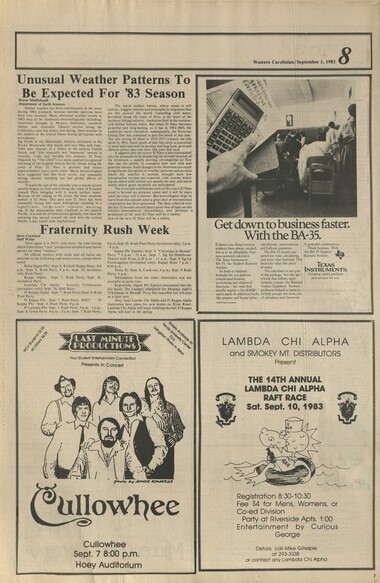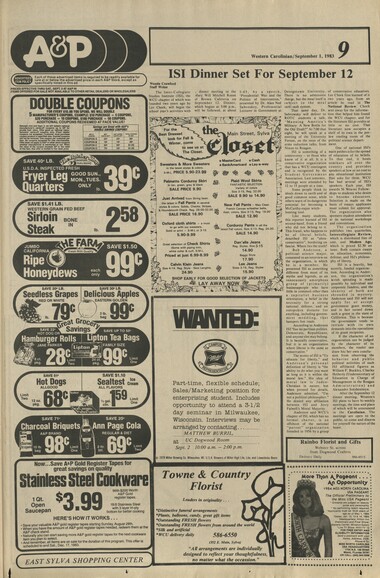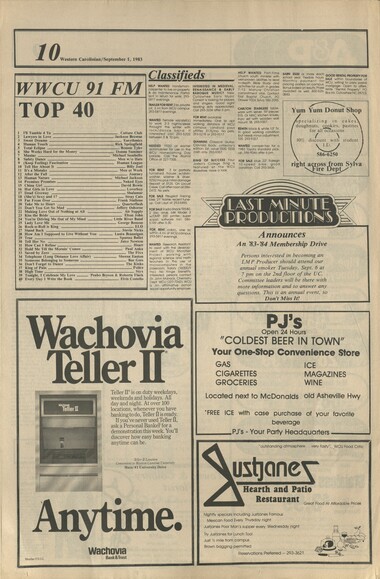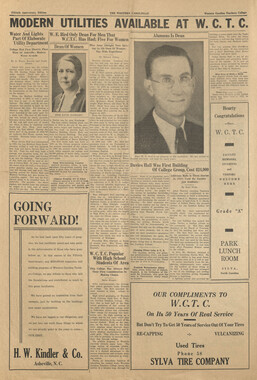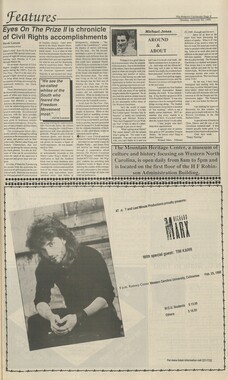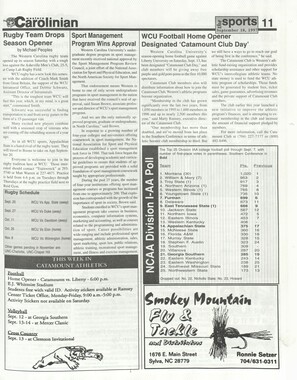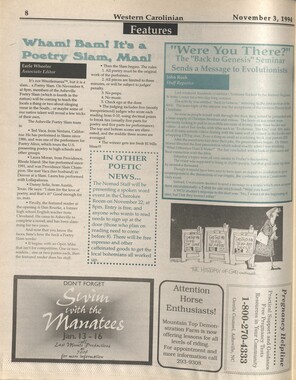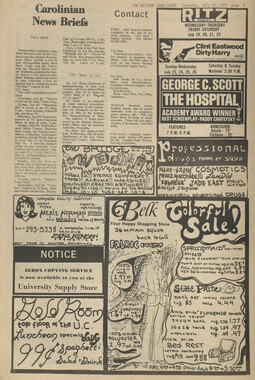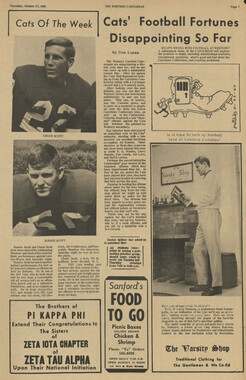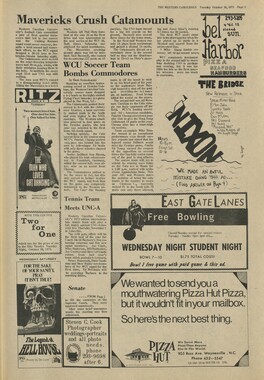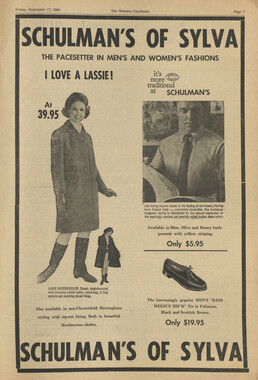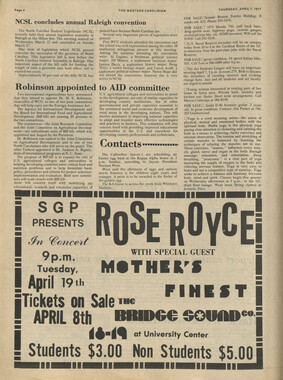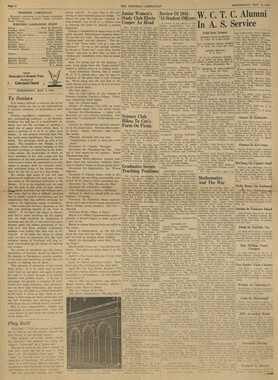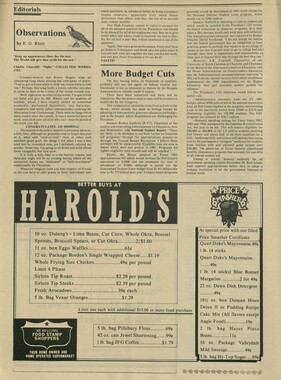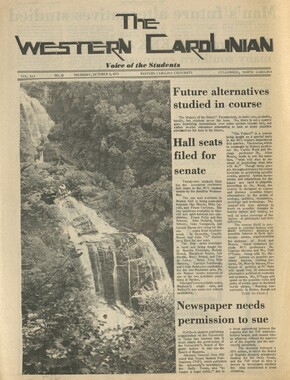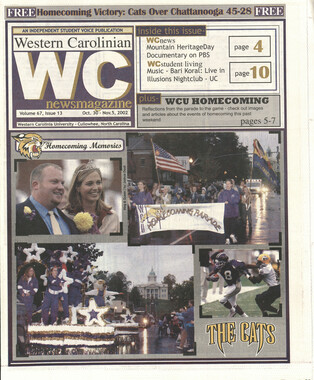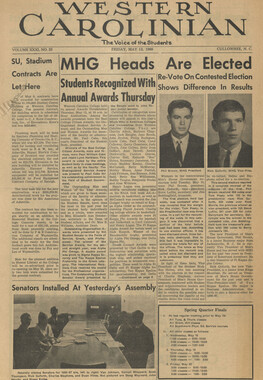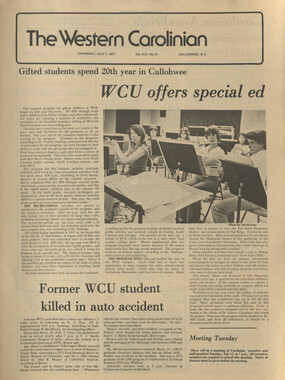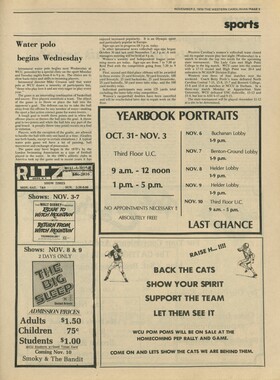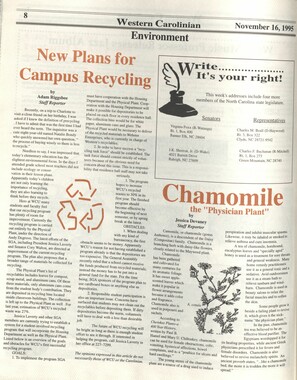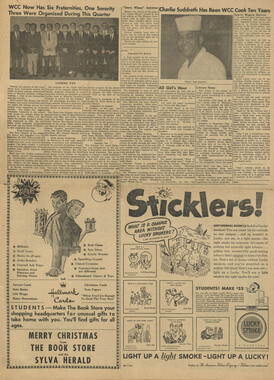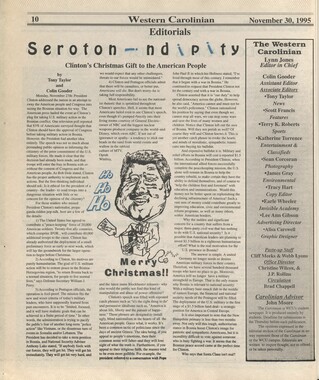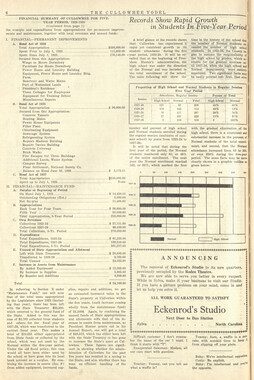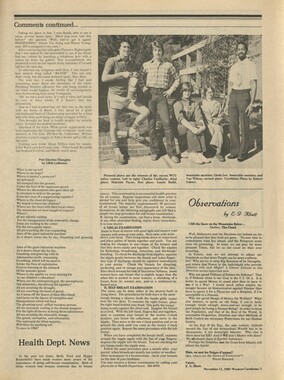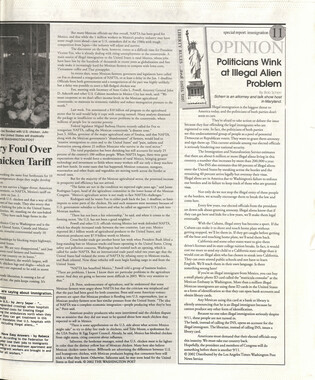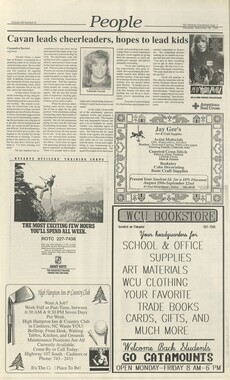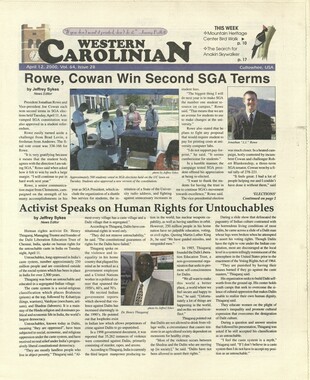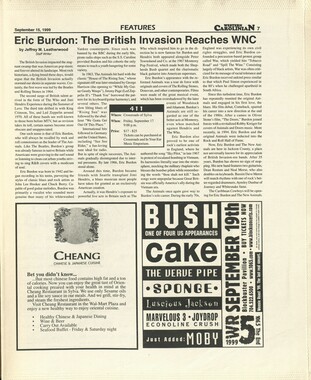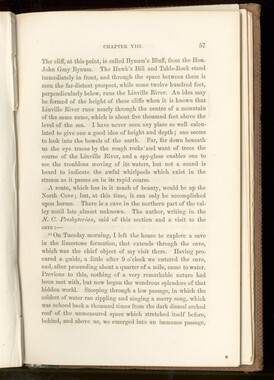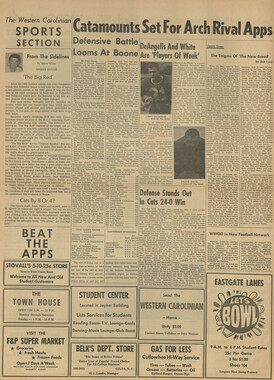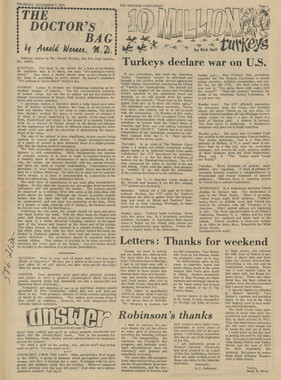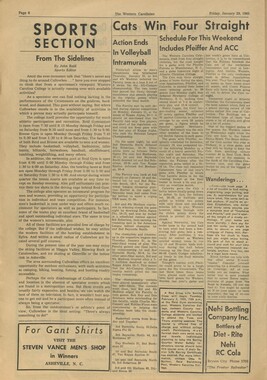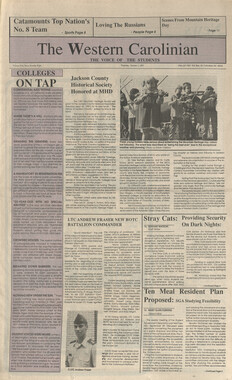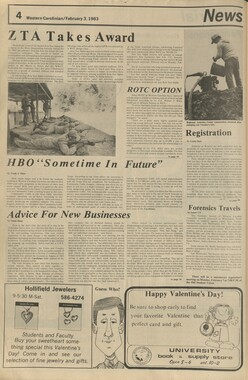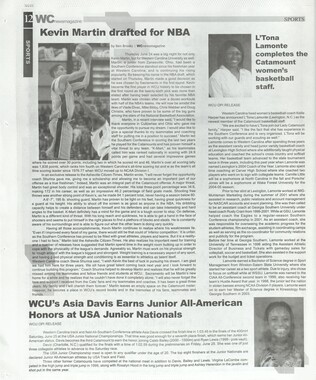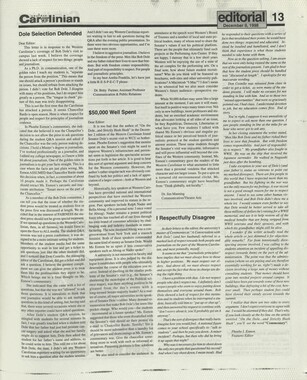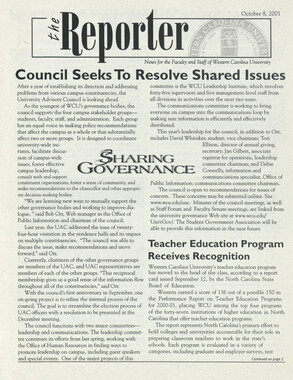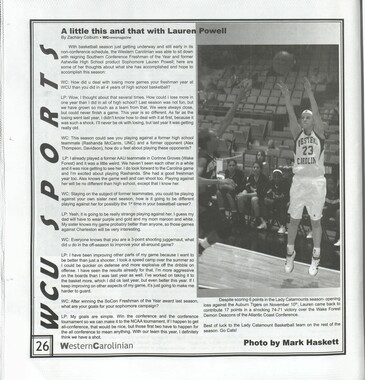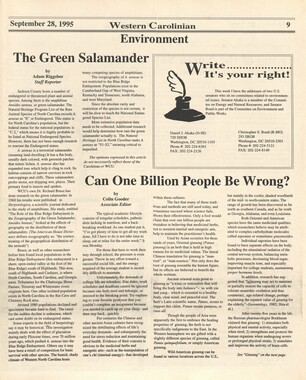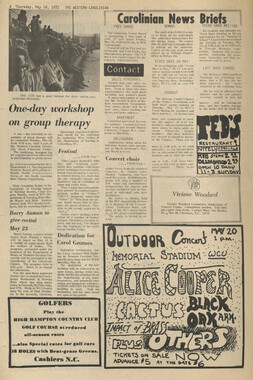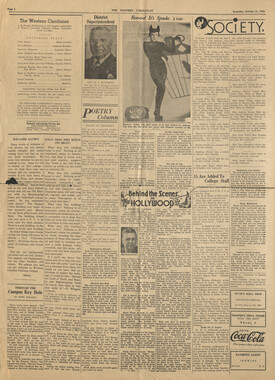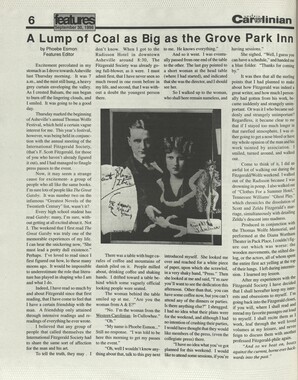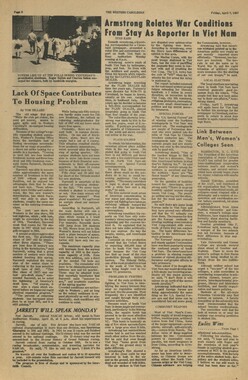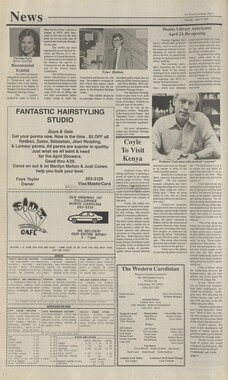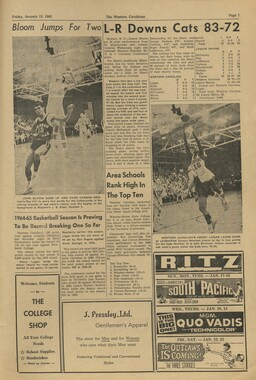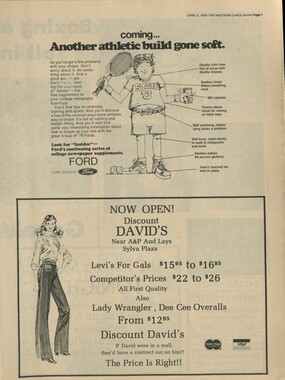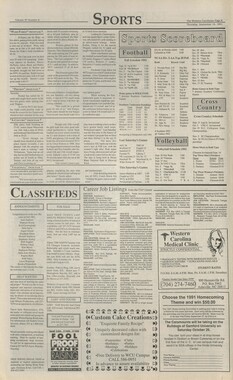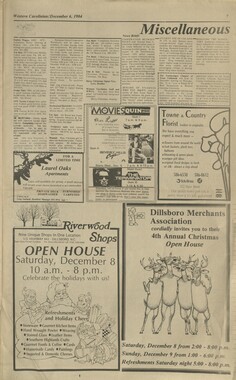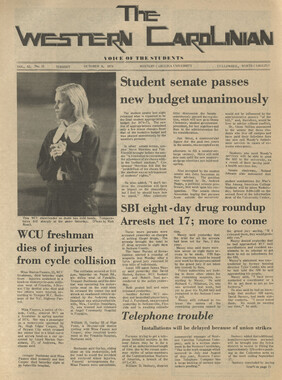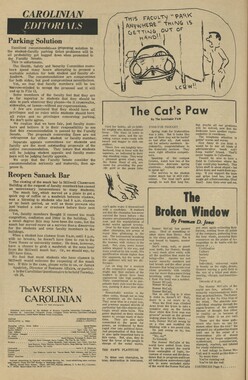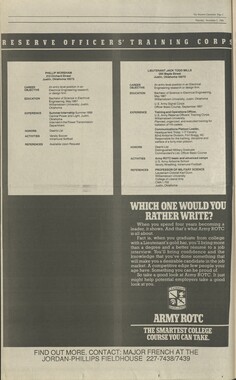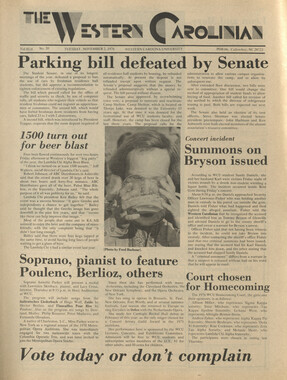Western Carolina University (20)
View all
- Canton Champion Fibre Company (2308)
- Cherokee Traditions (291)
- Civil War in Southern Appalachia (165)
- Craft Revival (1942)
- Great Smoky Mountains - A Park for America (2946)
- Highlights from Western Carolina University (430)
- Horace Kephart (941)
- Journeys Through Jackson (159)
- LGBTQIA+ Archive of Jackson County (85)
- Oral Histories of Western North Carolina (314)
- Picturing Appalachia (6798)
- Stories of Mountain Folk (413)
- Travel Western North Carolina (160)
- Western Carolina University Fine Art Museum Vitreograph Collection (129)
- Western Carolina University Herbarium (92)
- Western Carolina University: Making Memories (708)
- Western Carolina University Publications (2412)
- Western Carolina University Restricted Electronic Theses and Dissertations (146)
- Western North Carolina Regional Maps (71)
- World War II in Southern Appalachia (131)
University of North Carolina Asheville (6)
View all
- Allanstand Cottage Industries (62)
- Appalachian National Park Association (53)
- Bennett, Kelly, 1890-1974 (1388)
- Berry, Walter (76)
- Brasstown Carvers (40)
- Carver, George Washington, 1864?-1943 (26)
- Cathey, Joseph, 1803-1874 (1)
- Champion Fibre Company (233)
- Champion Paper and Fibre Company (297)
- Cherokee Indian Fair Association (16)
- Cherokee Language Program (22)
- Crowe, Amanda (40)
- Edmonston, Thomas Benton, 1842-1907 (7)
- Ensley, A. L. (Abraham Lincoln), 1865-1948 (275)
- Fromer, Irving Rhodes, 1913-1994 (70)
- George Butz (BFS 1907) (46)
- Goodrich, Frances Louisa (120)
- Grant, George Alexander, 1891-1964 (96)
- Heard, Marian Gladys (60)
- Kephart, Calvin, 1883-1969 (15)
- Kephart, Horace, 1862-1931 (313)
- Kephart, Laura, 1862-1954 (39)
- Laney, Gideon Thomas, 1889-1976 (439)
- Masa, George, 1881-1933 (61)
- McElhinney, William Julian, 1896-1953 (44)
- Niggli, Josephina, 1910-1983 (10)
- North Carolina Park Commission (105)
- Osborne, Kezia Stradley (9)
- Owens, Samuel Robert, 1918-1995 (11)
- Penland Weavers and Potters (36)
- Roberts, Vivienne (15)
- Roth, Albert, 1890-1974 (142)
- Schenck, Carl Alwin, 1868-1955 (1)
- Sherrill's Photography Studio (2565)
- Southern Highland Handicraft Guild (127)
- Southern Highlanders, Inc. (71)
- Stalcup, Jesse Bryson (46)
- Stearns, I. K. (213)
- Thompson, James Edward, 1880-1976 (226)
- United States. Indian Arts and Crafts Board (130)
- USFS (683)
- Vance, Zebulon Baird, 1830-1894 (1)
- Weaver, Zebulon, 1872-1948 (58)
- Western Carolina College (230)
- Western Carolina Teachers College (282)
- Western Carolina University (1899)
- Western Carolina University. Mountain Heritage Center (18)
- Whitman, Walt, 1819-1892 (10)
- Wilburn, Hiram Coleman, 1880-1967 (73)
- Williams, Isadora (3)
- Cain, Doreyl Ammons (0)
- Crittenden, Lorraine (0)
- Rhodes, Judy (0)
- Smith, Edward Clark (0)
- Appalachian Region, Southern (2569)
- Asheville (N.C.) (1923)
- Avery County (N.C.) (26)
- Blount County (Tenn.) (195)
- Buncombe County (N.C.) (1672)
- Cherokee County (N.C.) (283)
- Clay County (N.C.) (555)
- Graham County (N.C.) (233)
- Great Smoky Mountains National Park (N.C. and Tenn.) (519)
- Haywood County (N.C.) (3569)
- Henderson County (N.C.) (70)
- Jackson County (N.C.) (4804)
- Knox County (Tenn.) (35)
- Knoxville (Tenn.) (13)
- Lake Santeetlah (N.C.) (10)
- Macon County (N.C.) (420)
- Madison County (N.C.) (215)
- McDowell County (N.C.) (39)
- Mitchell County (N.C.) (132)
- Polk County (N.C.) (35)
- Qualla Boundary (981)
- Rutherford County (N.C.) (76)
- Swain County (N.C.) (2135)
- Transylvania County (N.C.) (270)
- Watauga County (N.C.) (12)
- Waynesville (N.C.) (86)
- Yancey County (N.C.) (72)
- Aerial Photographs (3)
- Aerial Views (60)
- Albums (books) (4)
- Articles (1)
- Artifacts (object Genre) (228)
- Bibliographies (1)
- Biography (general Genre) (2)
- Cards (information Artifacts) (38)
- Clippings (information Artifacts) (191)
- Copybooks (instructional Materials) (3)
- Crafts (art Genres) (622)
- Depictions (visual Works) (21)
- Design Drawings (1)
- Drawings (visual Works) (185)
- Envelopes (73)
- Exhibitions (events) (1)
- Facsimiles (reproductions) (1)
- Fiction (general Genre) (4)
- Financial Records (12)
- Fliers (printed Matter) (67)
- Glass Plate Negatives (381)
- Guidebooks (2)
- Internegatives (10)
- Interviews (815)
- Land Surveys (102)
- Letters (correspondence) (1013)
- Manuscripts (documents) (618)
- Maps (documents) (177)
- Memorandums (25)
- Minutes (administrative Records) (59)
- Negatives (photographs) (6015)
- Newsletters (1290)
- Newspapers (2)
- Notebooks (8)
- Occupation Currency (1)
- Paintings (visual Works) (1)
- Pen And Ink Drawings (1)
- Periodicals (193)
- Personal Narratives (10)
- Photographs (12976)
- Plans (maps) (1)
- Poetry (5)
- Portraits (4539)
- Postcards (329)
- Programs (documents) (151)
- Publications (documents) (2364)
- Questionnaires (65)
- Relief Prints (26)
- Sayings (literary Genre) (1)
- Scrapbooks (282)
- Sheet Music (2)
- Slides (photographs) (402)
- Songs (musical Compositions) (2)
- Sound Recordings (796)
- Specimens (92)
- Speeches (documents) (15)
- Tintypes (photographs) (8)
- Transcripts (322)
- Video Recordings (physical Artifacts) (23)
- Text Messages (0)
- A.L. Ensley Collection (275)
- Appalachian Industrial School Records (7)
- Appalachian National Park Association Records (336)
- Axley-Meroney Collection (2)
- Bayard Wootten Photograph Collection (20)
- Bethel Rural Community Organization Collection (7)
- Blumer Collection (5)
- C.W. Slagle Collection (20)
- Canton Area Historical Museum (2110)
- Carlos C. Campbell Collection (462)
- Cataloochee History Project (64)
- Cherokee Studies Collection (4)
- Daisy Dame Photograph Album (5)
- Daniel Boone VI Collection (1)
- Doris Ulmann Photograph Collection (112)
- Elizabeth H. Lasley Collection (1)
- Elizabeth Woolworth Szold Fleharty Collection (4)
- Frank Fry Collection (95)
- George Masa Collection (173)
- Gideon Laney Collection (452)
- Hazel Scarborough Collection (2)
- Hiram C. Wilburn Papers (28)
- Historic Photographs Collection (236)
- Horace Kephart Collection (861)
- Humbard Collection (33)
- Hunter and Weaver Families Collection (1)
- I. D. Blumenthal Collection (4)
- Isadora Williams Collection (4)
- Jesse Bryson Stalcup Collection (47)
- Jim Thompson Collection (224)
- John B. Battle Collection (7)
- John C. Campbell Folk School Records (80)
- John Parris Collection (6)
- Judaculla Rock project (2)
- Kelly Bennett Collection (1407)
- Love Family Papers (11)
- Major Wiley Parris Civil War Letters (3)
- Map Collection (12)
- McFee-Misemer Civil War Letters (34)
- Mountain Heritage Center Collection (4)
- Norburn - Robertson - Thomson Families Collection (44)
- Pauline Hood Collection (7)
- Pre-Guild Collection (2)
- Qualla Arts and Crafts Mutual Collection (12)
- R.A. Romanes Collection (681)
- Rosser H. Taylor Collection (1)
- Samuel Robert Owens Collection (94)
- Sara Madison Collection (144)
- Sherrill Studio Photo Collection (2558)
- Smoky Mountains Hiking Club Collection (616)
- Stories of Mountain Folk - Radio Programs (374)
- The Reporter, Western Carolina University (510)
- Venoy and Elizabeth Reed Collection (16)
- WCU Gender and Sexuality Oral History Project (32)
- WCU Mountain Heritage Center Oral Histories (25)
- WCU Oral History Collection - Mountain People, Mountain Lives (71)
- WCU Students Newspapers Collection (1843)
- Western North Carolina Tomorrow Black Oral History Project (69)
- William Williams Stringfield Collection (2)
- Zebulon Weaver Collection (109)
- African Americans (390)
- Appalachian Trail (35)
- Artisans (521)
- Cherokee art (84)
- Cherokee artists -- North Carolina (10)
- Cherokee language (21)
- Cherokee pottery (101)
- Cherokee women (208)
- Church buildings (172)
- Civilian Conservation Corps (U.S.) (111)
- College student newspapers and periodicals (1933)
- Dams (107)
- Dance (1023)
- Education (222)
- Floods (61)
- Folk music (1015)
- Forced removal, 1813-1903 (2)
- Forest conservation (220)
- Forests and forestry (1184)
- Gender nonconformity (4)
- Great Smoky Mountains National Park (N.C. and Tenn.) (181)
- Hunting (45)
- Landscape photography (25)
- Logging (119)
- Maps (83)
- Mines and mineral resources (8)
- North Carolina -- Maps (18)
- Paper industry (38)
- Postcards (255)
- Pottery (135)
- Railroad trains (72)
- Rural electrification -- North Carolina, Western (3)
- School integration -- Southern States (2)
- Segregation -- North Carolina, Western (5)
- Slavery (5)
- Sports (452)
- Storytelling (243)
- Waterfalls -- Great Smoky Mountains (N.C. and Tenn.) (66)
- Weaving -- Appalachian Region, Southern (280)
- Wood-carving -- Appalachian Region, Southern (328)
- World War, 1939-1945 (173)
Western Carolinian Volume 48 Number 05
Item
Item’s are ‘child’ level descriptions to ‘parent’ objects, (e.g. one page of a whole book).
-
-
Time (And Gas) Is Running Out I talked last week about student attitudes toward traffic tickets here at WCU. This week I want to note several instances where 1 encountered irregular parking practices on campus. Wednesday morning, August 31,1 drove from my house on River Road to my office building, the Old Student Union, at 9:30 a.m., hoping to get some work done before my 10:00 class. There were no parking spaces to be found at my office, Moore Building, Graham Infirmary, or Madison Residence Hall. 1 assume that parking in the area of Moore and the Old Student Union is for commuters, faculty and staff. I counted four Resident stickers on those cars parked, two of which were parked in front of my offices. Now, I realize that it's a bit of a walk up the Hill to Moore from Scott, Walker, Helder, or the other reidence halls down campus, but for a resident to drive to Moore for classes strikes me as unusually lazy and inconsiderate. Back to more irregular parking. 1 drove from Moore to the parking lot at Forsyth Building, but no dice. (At least all those cars in that commuter section were commuters.) From Forsyth, I tried the gym, but again no luck. Residents had decided to occupy five of the few commuter spaces there. As it was nearing 9:45, 1 decided to go ahead and park in the commuter lot behind the Music/English Building, as I wanted to be on time for class in McKee. This time seven residents and two staff members had taken nine of the Commuter spaces, and there was no room for me, even after three trips around the parking lot. Time was running out. I went to the commuter lot behind Hunter Library, where only eight residents and two staff members had taken Commuter spaces. After two trips around the entire lot, 1 was lucky enough to spy a commuter leaving, and took his space. Throwing on the emergency brake, 1 killed the ignition and grabbed my books. 1 hurried behind the library and the Natural Science Building to McKee. I raced up the steps and rounded the corner to room 202. Breathlessly entering the classroom, I glanced at my watch as I pulled up a chair. 10:07. Thirty-seven minutes just to find a parking space. Twenty-eight potential spaces for which I had paid with my Commuter fee occupied by resident and staff cars. 1 feel that walking is not too difficult for a resident on this campus. It takes approximately ten minutes to get from one end of the campus to another, and for residents to blatantly rob commuters of their parking spaces is thoughtless and illegal. Likewise for WCU staff, who have convenient spaces near their places of work. As far as I am concerned, a $5 ticket to too good for these people. I would prefer that a tow truck tour the commuter lots each morning, removing offending vehicles and placing them in the impound lot in the freshman parking area, to be removed on payment of $50. (The same should be done to commuters who park in resident or staff spaces.) As this is not feasible, I have another proposal. Allow only upperclassmen to bring cars on campus. Use the extra space that would be left by the freshmen vehicles to be turned into faculty, staff and commuter parking. I am concerned as to what other students think, residents as well as commuters. Let me know with a letter to me in care of this newspaper. Or, perhaps you can hand deliver it to me. I have recently learned of a commuter section behind the water tower on the Hill. Just place your letter under my windshield wiper. Thoughts At Large Field Newspaper Syndicate —^—————■— negotiations to end El Salvador's civil war might —^. .. encourage more potential refugees to stay home. /^Maxwell ■ ■ |{*n Donald Woods, a South African journalist once ^L«P lwll imprisoned for his anti-apartheid activities, has formed SrVwfll an organizat'on to inform foreign journalists and « " go\crr lent officials about developments in his home ||©cirCr count. The new group, Lincoln Trust, will have its U.S. ^^^^^^^^^^^^^^^^^^^^- office in Washington. John Tower's decision to step down from his Senate inc Avrcicc *„ „ f .• seat after nearly four terms has irked White House LOS ANGELES—As one reason for supporting his cc. . , _ J ^ „ ... , , ,.. 1,0^ iin„ a„ n c„i„^„ d ^.a .ii if «" j off lcials. Tower, a Texas Republican and chairman of the hard line on h! Salvador, President Reagan has offered „ . , J. „ K _ . , , , . , .»,» ,,™c„„o. ~r ,-„<•,.„,>„,. n a- .u- . Senate Armed Services Committee, had already received the prospect ol refugees flooding this country to escape . , ... ... . , •'. . . .' ,. communism substantial political assistance from the administration in n„. ;r »,» „ ,„ . „ „ , ■ ... anticipation of a tough re-election fight next year. As an But it pre-empting uncontrolled immagration is his " c- ■ . .■ t- ,.j ■• r,.,rr.^c« ,ha>r, tu„ „,„„j„„,i i- <• •, expression of its interest in Tower s stand on immigration purpose, then the presidents policies are a failure. . F A. ,,,,. „ ., . . ...* . . r„„(„i a~,0-;,.„„,. u„. n„A i.Liic • .l i a a issues, the White House is said to have established its Central Americans have fled to the U.S. in the hundreds ,,.'., ., ,, . „ .. , of thousands, and a large number - possibly as many as lates; task /or£ °n. boIder Problems- the Southwest 500,000 - have come from El Salvador, a nation of only B°rder StatCS W°rkmg Gr0Up- 4.7 million. _ ••,,„• . . u„-„ ;„ d„, „ « r u . ,mm„ Phihppine opposition leader Benigno Aquino s Here in Reagan s former hometown, some 200,000 u . i •• .■ . »u f, . , . Salvadorans are said to live, with 50,000 squeezed into brUta' assassination at the man.la airport last weekend L.A.'s downtown Pico-Union district. should have fueled the imagination of anyone who Wl;,„ „„ D- „ 0„ , ,, . _ • , , . -._. remembers the Nicaraguan revolution. In 1978, a While on Pico Boulevard commercial symbols of El ••,,.• .- • • c- ■ ™ _i\ c„i„„j„pV „,„ • < i, c i similarly charismatic opposition figure, La Prenza editor Salvador s growing U.S. presence stare openly at „ . i. yy a .u . . t . „, ., _, r j Pedro Chamorro, was gunned down on the streets of KTS^,S 'StFn S TirH0W W!th f»mKili«wh0 Managua. As is likely in Aquino's death, Chamorro's hide in Pico-Unions dilapidated apartment buildings, .... 6 .. '.- , /* . \ , „<•.„„ ;„ „„„ „ a ~ .i a . j i- X killers were never identified but were nonetheless linked often in one room. As mostly undocumented aliens, the .. , , ,• ,• . . ,• xr , .... r .:„ .. .. to the nation s long-ruling dictator (in Nicaragua s case, occupants are hiding from U.S. authorities. . ,, 6n . , , 6 Anastasio Somoza Debayle). "Ihe Salvadorans are a frightened refugee It's generally concluded, too, that Chamorro's death population." says Aurora Martinez, a retired nurse who served most t0 unjte ai| 0f Nicaragua against Somoza's coordinates health care efforts for Pico-Union's Oscar R. ruie. Time will tell whether history repeats itself in the Romero clinic. "They exhibit all the worst symptoms ofa iancj 0f Ferdinand Marcos. stressed, war-torn population." Origins only exacerbate the bleak employment. Cynthia Anderson, referring to proposed federal British disarmament activists are apparently finding restrictions on employers who hire undocumented rock bands reluctant to play benefit concerts. One reason workers: "With the passage of the Simpson-Mazzoli bill seems to be that some of the more outspoken groups — in the H ouse, no employer wants to hire an illegal alien The Clash, The Specials and Peter Gabriel, for example - and get fined. have recently disbanded. Another reason, however, is Few Salvadoran refugees, however, seem prepared more telling about Britain: At two recent "rock the to return home just yet, or even if and when Central bomb" festivals, divisions among concert-goers led to America's strife subsides. But, they say, serious peace mud-hurling and minor skirmishes. Western Carolinian ■ ==-^-_ - Editor-in-Chief Monica Henson Business Manager Kenn Port Design Editor Tony Cole Photography Editor Mark Haskett Sports Editor Russ Randolph News/Feature Editor Greg Ryder Layout Dan Mangold Ad Design Debbie McElroy Production Lynn Hamrick, Tammy Greene, Marti Scarborough Ad Sales Mark Clark, Robert Hosack Circulation Manager Larry Woods Sportswriters Mark Newsome, Doug Irwin Entertainment R-A. Bush, Brett Lawson Staff Writers Wanda Crawford, Rebecca Lines, Alex Lesueur, Lawrence Hamrick, Jr., Steve Crawford, Jim Spencer, Heather Frey, Cathy Stewart, Joe Fournier SSflfc* WoiSld?AfcJ... Letters Tough New Laws Going Into Effect An Open Letter to College and University Students: On October 1, 1983, North Carolina will have a new set of laws dealing with those who operate a vehicle while impaired by alcoholic beverages or any other impairing substance. The Safe Roads Act of 1983 does much more than raise the drinking age for beer and unfortified wine to 19. We would like for the students attending our colleges and universities to be aware of the new law. Perhaps the best way to explain some of the comprehensive provisions of the new law is to state a hypothetical case involving a student -- we will call him Joe — stopped by a State Highway Patrolman for driving under the influence of an impairing substance. Joe may have been stopped at one of the roadblocks law enforcement agencies can now establish under the Safe Roads Act to check for drunk drivers. He may have been stopped because the trooper saw him drinking a beer while driving. Under the Safe Roads Act. it is unlawful for the driver of a vehicle to consume any alcoholic beverage while driving. Under the new law, Joe can be arrested and charged under the single offense of impaired driving. There are no lesser included offenses, such as careless and reckless driving after drinking, in the new law; thus, there will be no more plea bargaining. There is only one charge, and it can be proved in one of two ways: (1) By showing the driver's physical or mental faculties are appreciably impaired by an impairing substance or; (2) By showing the driver's alcohol concentration (AC) is 0.10 or more. If Joe refuses to submit to a chemical test, his license will be revoked for one year. He can apply for limited driving privileges only after surrendering his license for six months of the revocation. If Joe registers 0.10 AC or more on a chemical test, or refuses the test he will be taken before a magistrate and his license will be suspended immediately for 10 days. This is mandatory. No one gets off. Out-of - state students will have their privilege to drive in North Carolina suspended for 10 days, just the same as students licensed in North Carolina. If the magistrate determines Joe is too impaired to be released, the magistrate is empowered under the act to hold Joe for up to 24 hours or until a responsible, sober adult will take responsibility for him. In no event may Joe be held for more than 24 hours. Next, Joe will have a trial on the charge. If Joe is convicted of driving while impaired, the law requires the judge to hold a sentencing hearing where Grossly Aggravating Drunk Driving (GADD) factors, aggravating factors and mitigating factors are presented by the prosecutor and defense attorneys. The judge must weigh these factors in imposing sentence. If two GADD factors (a prior impaired driving offense in the past seven years, driving with revoked license for an impaired offense, causing an accident resulting in serious injury to another) are present, there is a mandatory minimum jail term of 14 days and'Joe can be fined up to $2,000. If one GADD factor is present, Joe faces a mandatory minimum seven days in jail and a fine up to $ 1,000. If Joe has two or more prior convictions for driving impaired within seven years, punishment is the same as if he had two GADD factors. If no Gadd factors are present, the judge weighsthe aggravating and mitigating factors. If aggravating factors outweigh mitigating factors, Joe can be sentenced to a minimum of 72 hours in jail, or 72 hours of community service or 90 days without driving or a combination of all. He also faces a fine of up to $500. If aggravating and mitigating factors balance out, Joe faces a sentence of 48 hours in jail, 48 hours community service or 60 days without driving or a combination of all. Additionally, Joe can be fined up to $250. If the mitigating factors outweigh the aggravating factors, Joe faces a jail term of 24 hours, or 24 hours community service or 30 days without driving or a combination of all. Joe can be fined up to $100. Some aggravating factors are: gross impairment or an AC of 0.20 or more; especially reckless driving; an accident causing over $500 damage or personal injury; driving while license revoked; two or more 3-point motor vehicle offenses within 5 years, or one or more prior convictions of DWI more than 7 years old; speeding to elude arrest; speeding more than 30 miles per hour above the posted limit; and passing a stopped school bus. Some mitigating factors are : slight impairment solely from alcohol, AC of 0.11 or less; slight impairment solely from alcohol and no chemical test available; generally safe driving at time of offense; no serious traffic offenses within past 5 years; impairment caused by lawfully prescribed drug; and voluntary submission to treatment before trial. If this is Joe's first impaired driving offense, he will lose his driving privilegs for one year. He is eligible for a severely curtailed limited driving privilege only after he has served a court-ordered period of vehicle non-operation. If it is Joe's second offense, he loses his license for four years and can get no limited privilege. Revocation is permanent for the third offense. In matters of license revocation for out-of-state students. North Carolina has reciprocity with most states for impaired driving crimes. The North Carolina Division of Motor Vehicles would send the report of your conviction to your home state and that state could apply the sanction. In any event,North Carolina will revoke your privilege to operate a motor vehicle in this state. If Joe holds a North Carolina provisional license (issued to 16- and 17-year olds) and is convicted of DWI or refuses to take a chemical test, or is caught driving with any amount of alcohol or any impairing substance in his system^ (excluding prescriptions taken in a lawful amount), his license will be revoked until he is 18, or for 45 days, whichever is, longer. The law also provides a one-year license revocation if: (1) An underage person attempts to purchase or purchases an alcoholic beverage; (2) An underage person aids or abets another to attempt to purchase or purchases an alcoholic beverage; (3) An underage person attempts to purchase, purchases, or possesses alcoholic beverages by using or attempting to use a fraudulent driver's license or other I.D. for that purpose. If Joe registers 0.20 or more on a chemical test, he will be referred to an appropriate public or private facility for treatment and counseling. AC levels in those ranges are indicative of problem drinkers. Problem drinkers cause the majority of accidents involving impaired drivers. If Joe is caught for DWI after his license is revoked, he faces forfeiture of his vehicle. Another important aspect ofthe Safe Roads Act which may affect students is the "Dramshop" provision. Under this provision, negligent sale of beer, wine or liquor to an underage person may subject the seller to civil liability if the underage person then consumes the beverage and as a result of consuming the beverage has an accident while driving impaired. This provision led operators of establishments which sell alcoholic beverages to ask for the power to hold a person's I.D. for a reasonable time to check the I.D.'s validity. The seller must tell the person why he is holding the I.D. In addition to the criminal and administrative sanctions mentioned above, Joe faces a host of other problems arising from a conviction for DWI. If he is a first offender, he will be required to pay for and attend classes at one of the state's Alcohol Drug Education Traffic Schools. His car insurance will climb precipitously. Whatever it cost before conviction, it will now cost him 395 percent more—395 percent more for three years! It is not worth it to drink and drive. Your personal costs are too high. The costs to society are too high. If you drink, don't If you drive, don't Sincerely, Heman R. Clark Secretary NC Department of Crime Control and Public Safety drive. drink. L
Object
Object’s are ‘parent’ level descriptions to ‘children’ items, (e.g. a book with pages).
-
The Western Carolinian is Western Carolina University's student-run newspaper. The paper was published as the Cullowhee Yodel from 1924 to 1931 before changing its name to The Western Carolinian in 1933.
-
